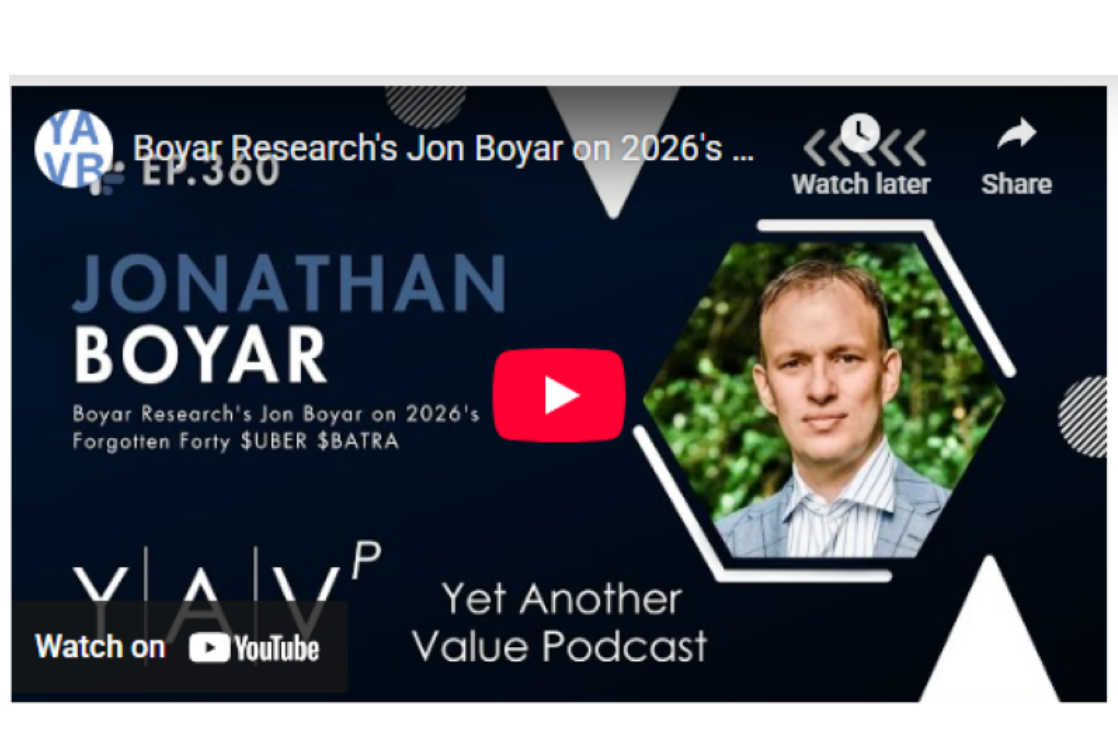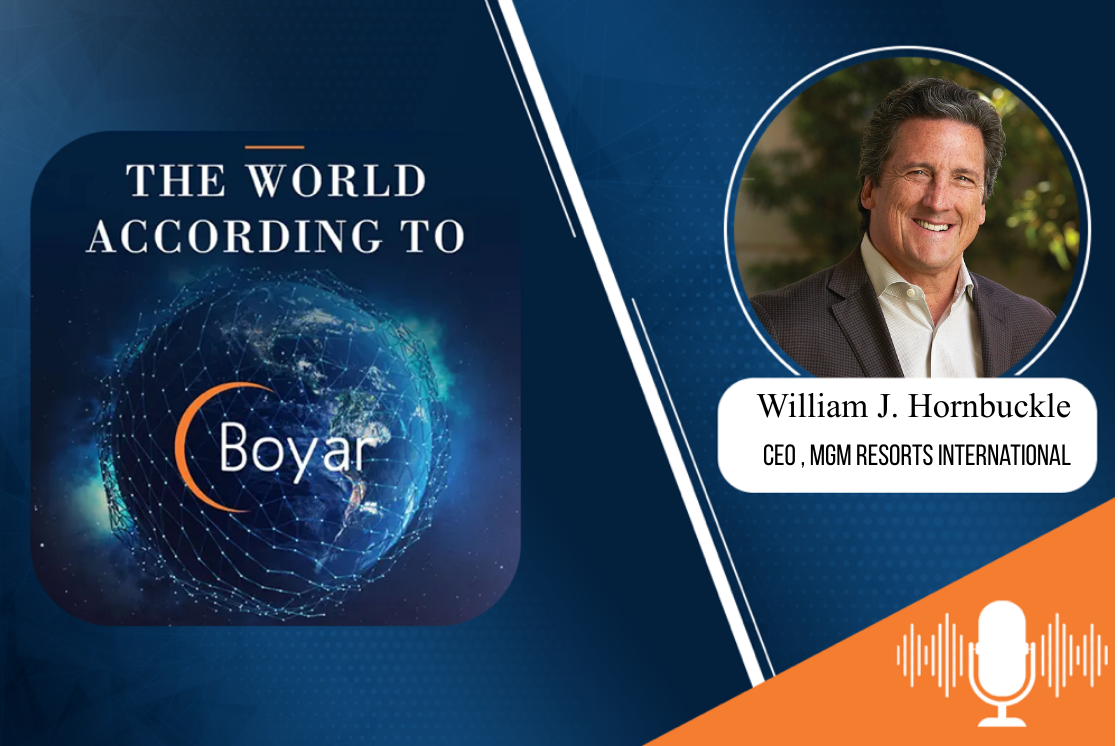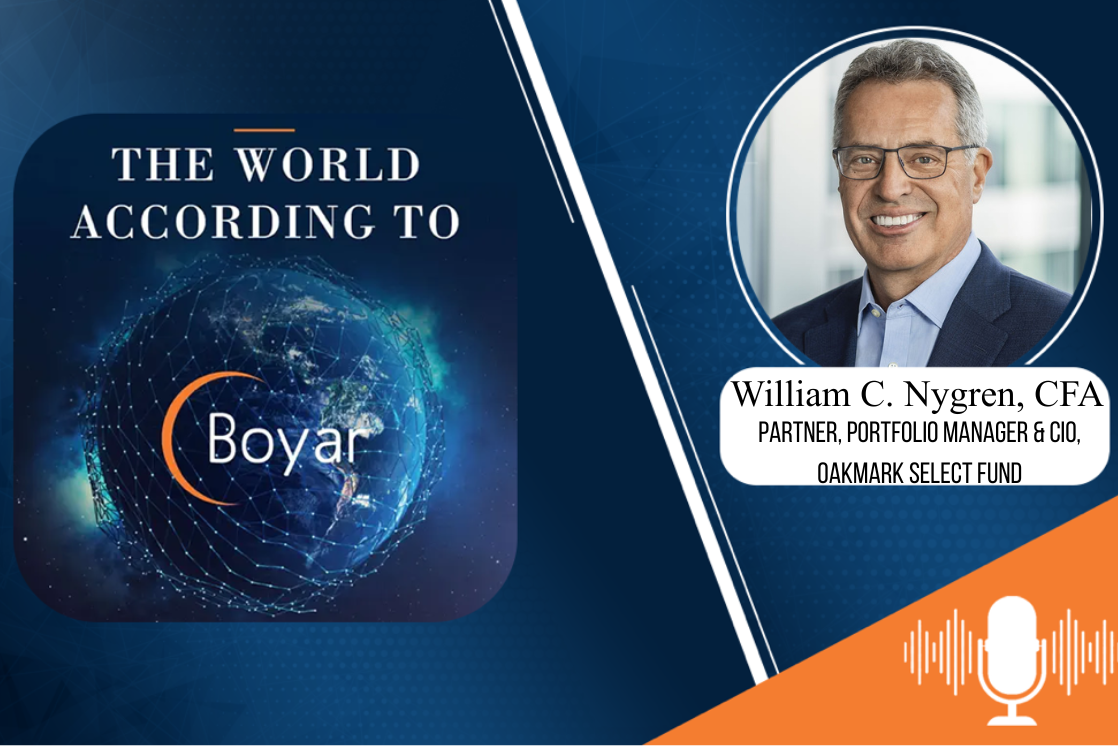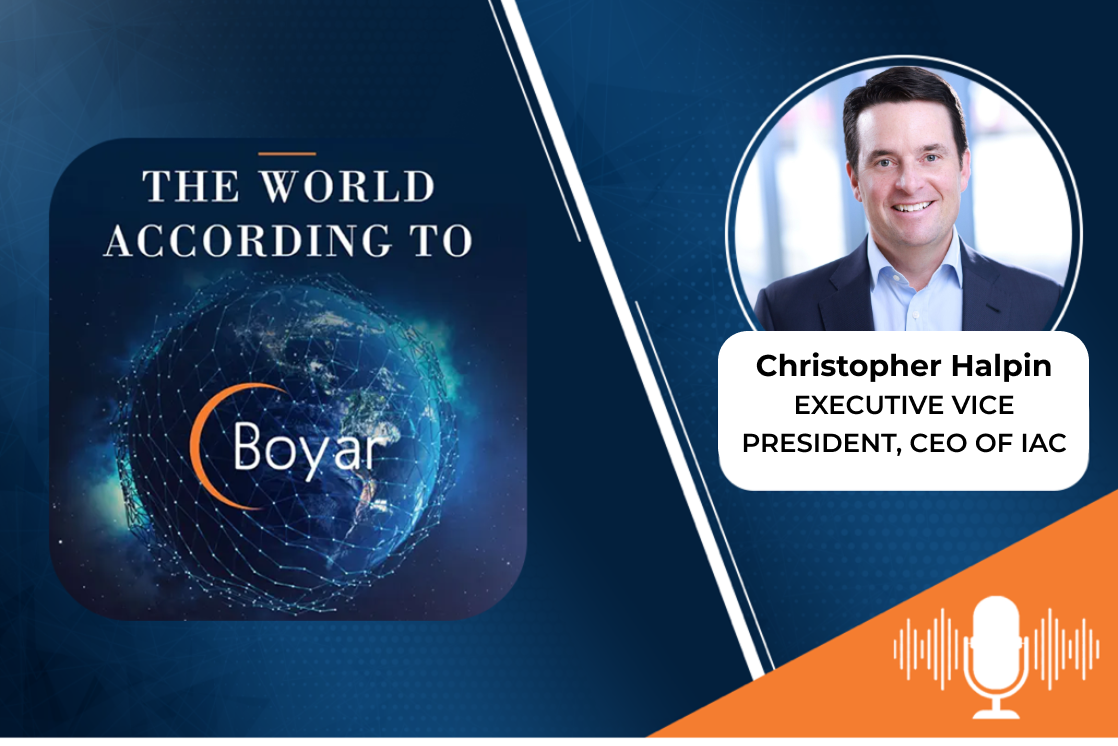David Alpert, Executive Producer of The Walking Dead, CEO of Skybound Entertainment on what he did that helped turn The Walking Dead into an international sensation.
The Wall Street Journal’s Spencer Jakab on the real winners of GameStop mania, Robinhood’s role in encouraging stock speculation (and how it came very close to bankruptcy), and how Chamath Palihapitiya and Elon Musk fueled the flames of the whole debacle. - Value Investing Podcast
Boyar's Three Conviction Stock Picks For 2019 - Boyar Value Group
Scott Turow, Best Selling Author on the "golden age" of content creators and the economics of the publishing industry. He also discusses whether Amazon is currently engaging in anti-competitive behavior. - Value Investing Podcast
The interview discusses:
- How David and Robert Kirkman took the Walking Dead comic book series and turned it into the most watched show in cable television history;
- What it means to sell a television show to a network in terms of both economics and creative control;
- The actual role of a television and film producer;
- What David and Robert did (that had never been done before) that helped turn The Walking Dead into an international sensation;
- What it means that Skybound signed a “First Look” deal with Amazon;
- David’s view on whether the current level of spending on content by companies like Amazon and Netflix are sustainable (and whether he believes they make economic sense);
- David’s thoughts on the competitive position of content providers like Disney;
- What low-tech form of entertainment is making a huge comeback and how Skybound is profiting from it in a major way
About David Alpert
David Alpert is CEO of Skybound Entertainment, founded alongside longtime collaborator Robert Kirkman. Alpert is a prolific producer, with television credits including The Walking Dead and its companion series Fear The Walking Dead, Outcast, Robert Kirkman’s Secret History of Comics, and Dirk Gently’s Holistic Detective Agency.
Click Below to Read the Interview Transcript
Transcript Of The Interview With David Alpert:
Jonathan Boyar: (00:10):
Welcome to The World According to Boyar where we bring top investors, bestselling authors, and market news-makers to show you the smartest ways to uncover value in the stock market. I’m your host, Jonathan Boyar. Our guest today is David Alpert, Executive Producer of multiple television programs and films, including The Walking Dead, which has the highest total viewership of any series in cable television history. It airs in over 120 countries and in 33 different languages. He’s also the CEO of Skybound Entertainment, a multi-platform content company he founded with Robert Kirkman. David, welcome to the show.
David Alpert (00:50):
Jonathan, thanks so much for having me. It’s a pleasure to be here.
Jonathan Boyar (00:52):
No, thanks for being on the show. You’re best known as Executive Producer of The Walking Dead. However, one thing that most people don’t know about you is growing up, you were a highly competitive athlete. You were captain of the Harvard swimming team, and made it pretty darn close to being an Olympian. Did the discipline it took to achieve that level of success prepare you for business success?
David Alpert (01:15):
Well, first, I think I was definitely a good swimmer. I was pretty far from being an Olympian. I’d like think as I’ve gotten older in the stories that I’ve gotten closer to being an Olympian, I’m a legend, perhaps maybe in my own mind. But, I think absolutely the discipline of having to get up starting at eight years old, and having to go to practice in the morning at 5:00 and be in the water 5:00 AM, it definitely helped. In some ways I feel like I never worked harder than when I was eight years old or nine years old. I was definitely sort of putting in the hours.
David Alpert (01:44):
The truth is now, honestly, the things that I do, it doesn’t feel so much like work. I mean, because I make everything from comic books, video games, movies, TV shows, and now wine, it’s like if I have a busy weekend of work, I have to take my work home, it means I’m going to have to play a video game, read some comic books, and watch TV, feels pretty good. It feels pretty good. It’s a lot less stressful than it used to be.
Jonathan Boyar (02:08):
So, you’re making wine?
David Alpert (02:09):
Yeah, we partnered with a company called Treasury Wine, and we have actually one of the fastest growing wine brands in the United States right now. We started with The Walking Dead. we did a blood red blend and a Cabernet, and then we launched a shark name, Sauvignon Blanc, and we’ve been tearing things up. It’s been really kind of fun. We built an AR app for it, so basically you hold up your phone in front of a bottle, and the zombie will jump out and break the screen, and you hold up another one, and Rick will come out and sort of kill the zombie, so every time you get a new bottle, it adds a little something to the story.
Jonathan Boyar (02:40):
That’s awesome. That’s certainly the definition of a brand extension.
David Alpert (02:44):
Yeah. For me, everything I want to do at my job is something that I love. So, it’s always work. But, if come in and I have to have a hard day at the office drinking wine and reading comics, it makes my life feel a lot better.
Jonathan Boyar (02:57):
So, you graduated from Harvard, went to NYU Law School, not exactly the traditional path to a career in the entertainment business. How’d you end up breaking into Hollywood?
David Alpert (03:07):
In law school, I quickly realized I didn’t want to be a lawyer. I had done a summer at a law firm and really quickly realized, I was like, this is just not the life for me. I felt very much that I was on the wrong side of the table. So, I was very much looking to say, “Hey, how do I get out and be an operator as opposed to sort of a service provider?” A buddy of mine who I met at that firm, he and I started a internet company and that was also a big thing to do back then, I guess as it is today. But this was 1.0, and we started this internet company and we had a little success and a lot of failures, but the best part was, it was the best way to get, basically while in law school, to get an MBA, because I would go to classes in the morning and then I’d be running a 50 person organization operation in the afternoons and in the evening. So, that was quite an education.
David Alpert (03:54):
I got out of that business and then started basically my own management company. I saw that there was an opportunity in film and television. There’ve been a number of successful movies that had come from sort of unknown or unheralded comic books. So, Men In Black was based off of a little comic that had sold maybe a thousand copies. The Crow, even little indies like Ghost World had been based off of this sort of independent comic book. So, I said, “Oh.” I grew up reading comics, and loving comics, and sort of trading, collecting and selling comics. So, I said, “Huh, maybe I can go find some of those people that I know, and I can help them bridge the gap between the comic book world and Hollywood.”
David Alpert (04:33):
So, that’s what I set out to do, honestly, knowing very few people and not doing much, I just started going to conventions and signing people up saying, “Hey, I’m going to take your products to Hollywood.” One of the people I met in that sort of first few months that I was doing it was Robert Kirkman, who went on to become the creator of The Walking Dead. So, very fortuitous, very lucky, but that was sort of the goal was finding great comic books that had film and television potential, and sort of being the conduit for them between their world and Hollywood.
Jonathan Boyar (05:02):
So, you met Robert Kirkman at a convention. At the time, obviously, his comic was well known in the comic book community.
David Alpert (05:10):
When I met him, he hadn’t done anything. The comic he was out there pushing was a comic called Battle Pope. It was this absolutely insane comic about a post apocalyptic New York where demons have sort of overrun the streets, and there’s a cigar chomping, whiskey swilling pope who’s living with his cockblocking roommate Jesus, and they’re out there trying to sort of save the doomed world, so pretty wacky, pretty out there, pretty indie. But, there was something both about the book, the writing was just really tight and taught, and there’s really something about Robert in the sense that I understood that he knew story, and he was charismatic, and he had sort of a certain charm to him that made me interested in knowing more about him and his work.
Jonathan Boyar (05:52):
How’d you go from that to landing at AMC? What were the steps that took you from that meeting to AMC, and eventually obviously getting it greenlit?
David Alpert (06:03):
It was a long way. So, the first is Battle Pope was actually the first thing we did together. We had made it into an animated web series at Spike.com, and we were the number one show on Spike.com. Robert and I found that we loved working together, that we had sort of a really good, creative collaboration, we had an opportunity to sort of really understand production together. It felt really good and we decided that we wanted to do more of it. Around that time is when he started working on The Walking Dead, and instantly we all knew that the comic was something different. It was unlike anything he had written previously. It was unlike anything that had ever really been in the market. Even though it was in a familiar genre, both the horror and zombie genre, it really treated it in a way that no one had looked at. That was something I was like, “Wow, if you could really innovate inside such a well explored genre, you’re really onto something.”
Jonathan Boyar (06:55):
So, then what happened after that?
David Alpert (06:57):
So, originally we had set up the show at NBC in 2005, and it didn’t go. Robert got very frustrated by that process. After the show got passed on NBC, everybody else wanted it. Robert said, “Listen, don’t come back until you production commitment, and somebody’s allowed us to retain the rights to market and merchandise based off my comic, not interested in anything else.” So, for four years we were out there shopping around, and got offers from most of the major networks in town, and a lot of the cablers offering to do the show. When I told them what we were looking for, they told me I was crazy. They told me that I’ll never work in this town again. Some people laughed. Some people hurled insults. Some people threatened me.
David Alpert (07:42):
Then finally in 2009, AMC stepped up to the table. They agreed to our terms and they committed to making the show. The book had been out at that point for six years in the market, and it had only gotten more and more successful. But four years in the wilderness between our failed attempts to get it off the ground at NBC, and sort of our successful attempt to get it off the ground at AMC. So, a really long time, and the patience that Robert exhibited in that moment, and the determination to say, “Hey, I don’t want to deal with Hollywood until this happens,” I thought it was both infuriating but also sort of empowering at the same time.
Jonathan Boyar (08:19):
So, for those of us who aren’t Hollywood insiders, what does it really mean to sell a show to a network?
David Alpert (08:25):
So, historically a network like a CBS or an NBC would develop, let’s say, 80 ideas in a season, a season being a course of a year. So, they develop 80 ideas. They would then, say of those 80, they’re going to shoot 10 pilots, and then they’d pick up somewhere between one and four of them given the year in their schedule and their needs. So, you had roughly somewhere between a two and five percent chance of having sold this idea to getting it made. So, it’s a lot of ideas get sold, not a lot of ideas get made, and of the ideas that get made, not many of them last. So, there’s a lot of half-lifes that go on there.
David Alpert (09:05):
So, that said, for every network, one of those networks was developing 80, they’d hear thousands, literally thousands of pitches, and then pick up that 80. So, the pyramid gets very, very tight at the top, but the bottom of the base was pretty huge. The economics have changed and the structure has changed a little bit now, but getting a guaranteed pickup back in the day was one, was really quite rare, but also sort of instantly pushed you through a lot of the clutter at the bottom of it.
Jonathan Boyar (09:33):
What do you give up when you sell a show to a network? Do you lose control? Do they tell you what you can write? How does that work?
David Alpert (09:41):
Yeah. In general, you lose control of pretty much everything. I mean, most of the ownership in a sort of original idea, so something that’s not based on source material, is instantly transferred and is governed by the WGA rules. So, there’s certain participations for the creator, but they’re very limited, and they sit behind the infamous Hollywood accounting. Whereas what you’re doing on source material, since the source material deal isn’t governed by the WGA, you have a little bit more freedom to sort of negotiate how ownership could work.
David Alpert (10:15):
So, sometimes they’ll allow you to keep, oh, you’re doing comics, so we’re going to let you also do comics and books, or, oh, you get to do a comic, but maybe you get to do some prints and merchandising based off it. But we basically were able to say, “Hey, we’re going to do everything we can based off of the comic other than competitive TV shows, of course.” But the thing for us is AMC was then also allowed to make stuff based off of the TV show. So, sometimes now we end up competing with AMC in the same category and sometimes fighting for the same shelf space.
Jonathan Boyar (10:48):
Are they making wine?
David Alpert (10:49):
They are. We are outselling them by an order of almost a hundred to one.
Jonathan Boyar (10:54):
Good for you.
Jonathan Boyar (10:57):
I hope you are enjoying The World According to Boyar. To ensure you never miss another podcast, as well as to hear the latest from the Boyar Value Group, please follow us on Twitter @BoyarValue. Now back to the show.
Jonathan Boyar (11:15):
So, something I always wanted to ask and could never really get a great answer to, what does a producer actually do?
David Alpert (11:22):
So, a producer is someone who puts something together. Producer can really be the CEO. So, every project is almost its own little venture company. So, the goal of a great entrepreneur is you’ve got to put together a great team. You’ve got to have your business thesis. You’ve got to have projected financials. You have to have sort of the market analysis. You have to know the right investors and institutions to sort of put it all together. I think that would be sort of, if you were to talk about in a venture community, that would be kind of the idea. It’s very similar here in Hollywood, a producer does the same thing. So you, you identify a space where you think there’s something interesting, say it’s action, thriller, horror or comedy, but you find that sort of that lane, you figure out what your thesis is, okay, people haven’t seen this recently or they haven’t seen this recently, or this was popular a long time ago, but no one’s doing it right now.
David Alpert (12:16):
Then you try to sort of analyze that and you build out your creative team. So, you’re assembling everything from the writers, the directors, the actors, and the money, and you’re trying to put the whole thing together and go. So, the day-to-day responsibility of a producer is incredibly varied and changes both on the day and the need. But in general, you’re sort of making sure that everything runs from inception all the way to delivery, and most times, all the way through marketing and consumption.
Jonathan Boyar (12:42):
So, going a little bit back to the success of The Walking Dead, one of the things that you said really launched it was when FOX bought the international rights to it. Why was that so important?
David Alpert (12:52):
We came on air in a very interesting inflection point in television history. So, a lot’s been said about sort of the change in television and it’s still happening. It’s still changing and it’s still very dynamic. But, we went from sort of a height of the network era to the point where now we’re having a lot of the basic cablers, in addition to some of the premium cablers, sort of really launching shows. AMC was launching successful shows. You had FX launching successful shows. The idea that there was some place besides the networks and HBO launching successful scripted shows was a relatively new phenomenon at the time.
David Alpert (13:29):
One of the things that’s a problem inside of the traditional television model, when you had a network show, they could cancel that almost at any time. So, if you remember when we were growing up, a show could be canceled after four episodes, or three episodes, sometimes shows would be infamously be canceled after one episode.
David Alpert (13:47):
So, the problem is if you went to then try to go sell that show overseas, a foreign broadcaster would often look at the success in the U.S. market as an indicator as to whether or not they should pick it up, because they knew that if the show was going to be a big hit in the United States, there was going to get a lot of press, there’d be a lot of tours, a lot of promotion. They also knew that there was going to be a steady supply of content. If the show had been on air for four or five years, you don’t have to worry that you’re going to invest a lot in marketing the show, then it’s going to be discontinued.
David Alpert (14:18):
So, one of the things that happened in the rise of the cable era, or the basic cable era, was people were getting picked up straight to series, and these cablers, because they had such smaller inventories compared to traditional broadcasters, a traditional broadcaster would be doing three to four hours of prime time television every night during the week, whereas a cabler might be doing two hours once a week, or maybe one hour once a week. So, the likelihood that that show would return, and it would be sort of carefully marketed to and sort crafted, was way, way higher.
David Alpert (14:53):
So, all of a sudden you have the opportunity to sell a show internationally day one, as opposed to having to wait two to three years. So, that was really a major sort of shift both in the business landscape of television. But in terms of why was it so significant to have FOX, again, the other thing is historically is a lot of the foreign marketplace had been fragmented. So, you literally had to hand sell the show country by country. Sometimes you had to sell it region by region, because even inside our country there were some times you’d sell it to a regional broadcaster and then you’d have to get picked up by other broadcasters.
David Alpert (15:28):
So, it was a very time consuming and tedious job. One of the great things about the FOX deal, is they had cobbled together FOX International Channels Group, which basically meant that with one deal we would be live in 60 or 70 countries essentially overnight. So, we did the first global day and date release for a television show. So, that had never been done before. So, the idea being that we aired Sunday night, 9:00 in the United States, and within 48 hours, we had been seen in 75 countries around the world, which now it’s commonplace, because now you have streamers, and you have Netflix, and you have all these different sorts of platforms, but back then that was groundbreaking revolutionary.
Jonathan Boyar (16:10):
It absolutely is. I’m definitely going to ask about the streamers in a second. You actually, I guess now it’s about an over a year ago, signed what they call a first look deal with Amazon. What does that actually mean?
David Alpert (16:21):
So, basically for these outlets, whether it’s a broadcaster, whether it’s a cabler, whether it’s a premium service or a streaming service, they’re all looking to sort of lock in suppliers. So, the relationship is we’re a supplier of content, so they will give us consideration capital in exchange for getting the opportunity to look at our projects first. So, the first look means basically, let’s say I have a new idea for the Jonathan Boyar show, and everyone’s really excited. Everyone thinks this is a great idea, but I’m like, the Jonathan Boyar show should really be an HBO show. But because I’m in a deal at Amazon, I have to show it to Amazon first, and if they want to buy it, they have a pre-negotiated deal with me where they can sort of buy the Jonathan Boyer show.
Jonathan Boyar (17:08):
I’m for sale.
David Alpert (17:09):
Well, we’ll talk about this after the podcast, we’ll make this happen. So, that was really sort of the goal. So, the good news is when you do these deals is that you have an invested buyer sort of on your behalf. I’m a seller of content provider of content. So, having a buyer allows me to sort of sharpen my focus in terms of I get to know their tastes a little bit better. They get to know sort of what I’m looking for. So, the goal is by being in one of these relationships, is that we’re able to sort of work with each other more closely, so that it’s more efficient and effective for me in the projects that I’m developing, and they don’t have to worry so much about supply. So, they’ll have dozens of deals with people like us, so that they basically know that they don’t necessarily have to compete on the open market for every project that comes up, even though they still do, but they know that they have sort of a good supply chain of product coming into the company.
Jonathan Boyar (18:02):
Not that you or Robert need credibility, but I imagine this helps when you speak to talent out there that you have an extremely deep pocketed person behind you.
David Alpert (18:12):
Of course, because anytime that you’re doing, you would want to know sort of what’s the path to market, what’s the route to market. So, some people, they’ll come like, “I have an idea I think is good for Amazon. What’s my route to get there?” They’re like, “Oh, that’s a good idea. It feels like a Skybound idea, or that feels like Jordan Peele, he has a deal there too.” So, they’re like, “Oh, Get Out was great. This is sort of more genre and race based, or comedy based. Let’s talk to him.” So, there’s a lot of different people that have different sort of vibes and opportunities there, so they might want to think about what’s the best way to access that buyer might be through one of the deals they’ve invested in?
Jonathan Boyar (18:49):
They’re spending like drunken sailors. I mean, is that current level of spending by them, Netflix, is that sustainable?
David Alpert (18:56):
The short answer is we don’t know. Historically, you’ve always had to justify your success of your show by viewership. That was because you were basically measuring audience against consumer products that you can sell for advertising. I can get more Ford commercials on my show because I was getting more ratings than my competitor. So, that was sort of the model. HBO was really the first place to be like, “You know what, we’re going to aggregate subscribers in exchange for our content.” But they were sort of very discriminating. They were a single competitor. There was nobody else out there doing what they were doing. So, it was a very different type of model.
David Alpert (19:37):
It’s really only now though that you have this sense of these guys are out there sort of not going through traditional cable networks. Netflix is something people are accessing all over the world in all different ways, and so they really pioneered a different model. But Amazon has completely different metrics. I’m not sure that I fully understand the economics behind Amazon’s desire to be in filmed entertainments, the idea being that it drives subscribers to Prime. Okay, I get that. But it is also one of those things where they have a completely different monetization tool than Netflix does, or Hulu does, or even HBO. Because those places, you’re the number of subscribers is the thing that generates the revenues, so you’re making content because that’s the thing, you’re exchanging subscriptions for content. Amazon, you’re getting all sorts of different things. My understanding is that more people are likely to be Prime subscribers because there’s the content there. So, they’re still sort of driven by getting many people to watch as possible.
David Alpert (20:39):
But ultimately I’m not 100% certain if it is sustainable or not. It might because maybe what you need is to get more and more market share. Maybe that’s the new world we’re living in. I’m guessing that there’s going to be periods of often peaks and valleys, but I feel with AT&T now coming in and watching their streaming service, and Disney buying FOX and launching their streaming service, and Apple coming online, I do feel like we are a little bit going to be in an arms race for a period of time. I don’t know that it’s sustainable forever for all of those companies to be doing it, but it certainly seems like the foreseeable future, there’s going to be a battle between some of these big behemoths.
Jonathan Boyar (21:19):
Well, speaking of Disney, it closed today with a market value of $168 billion. So, for $168 billion, you’re buying ESPN, ABC, one of the world’s greatest film studios with characters from Marvel properties, to Mickey Mouse, to Frozen, to Star Wars. Then you have Netflix, which while it’s growing and has some good original programming, but nowhere near the level of Disney, you can buy that today for $120 billion. As a guy who’s in the content business, does this make sense to you?
David Alpert (21:52):
I’m not going to be able to speak to valuation in quite the same way. I certainly think that Disney is a more valuable company than Netflix. If someone was like, “Hey, I’ll give you Netflix or I’ll give you Disney,” I would take Disney all day, just owning Marvel, Pixar, Lucas. I mean it’s pretty insane, and that’s not even touching sort of the core ESPN or the core Disney properties. So, I feel like those are some really amazing, amazing things. Probably Netflix now owns a lot of stuff too, but really what they seem to have is cultural mind share, and an opportunity to sort of really fight to take over people’s eyeballs as you’re trying to compete in that marketplace. Is that sustainable? Your guess is as good as mine. Over time though, I think that as people are able to flip between apps much easier than even having to switch between channels, and everything is sort of On Demand, I think that the best content is going to win out in the long run.
Jonathan Boyar (22:48):
Well, something that’s a lot easier are board games and I noticed that you sell them. Is that still a market?
David Alpert (22:54):
What’s interesting, what we’re finding as sort of a broad based social comment, is that as people spend more and more time in the digital worlds, people still want social experience. So, I think what is the thing that’s saving the music industry? Concerts. Concerts used to be marketing for album sales, or CD sales. But now they’re the big revenue drivers, that and streaming. But it’s the live event that’s coming up. We see in the comic book space, conventions are going crazy. There’s conventions for everything. There’s conventions for individual properties. We have Walker Stalker conventions for Walking Dead. There’s Star Wars conventions, Star Trek conventions, comic book conventions, board game conventions. Everybody wants it.
David Alpert (23:36):
What we’ve also seen is as the video game business has exploded, people want that social interaction directly. So, the board game business has really taken off. So, we’ve had a few hits in there. We started with this game called Superfight. That’s just been a huge, huge perennial hit for us. As we’ve gone from there, we’ve just seen that people just can’t get enough. So, we’ve seen everything from the rise of board game cafes, to board game conventions, and they’re all the same people that love digital entertainment. At the end of the day we’re animals and we need social interaction to feel happy, and so having people play board games is a great way to interact with people.
Jonathan Boyar (24:15):
Can you explain Superfight? It really is a great concept.
David Alpert (24:18):
So, Superfight sort of takes that classic thing, who would win, Hulk versus Superman?
Jonathan Boyar (24:24):
Hulk.
David Alpert (24:25):
I would agree. Hulk smash. That would be my argument. People have this conversation now, like who’s a better basketball player? LeBron versus Michael. What’d you say?
Jonathan Boyar (24:33):
Oh, Michael without question.
David Alpert (24:35):
See, I don’t know. I used to think that. Three years ago I would think that. Now, I’m like LeBron might be the GOAT. Not sure, but you could make an argument either way, and people do. So, this guy named Jack Dyer came up with this idea for Superfight. The notion was you pick cards and you essentially assemble your fighter. So, my fighter might be Bruce Lee made of peanut butter, and you could be Abraham Lincoln with a katana sword. So, then you and I would argue in a fight as to who would win. Our third friend would judge and say, “Oh, you know what, Jonathan wins.” Then we’d switch it up and play again. So, it’s a very simple game. It takes about 30 seconds to learn. Then we built out all these expansion decks. So, we’ve done everything from a Walking Dead deck, to an R-rated deck, to a G-rated deck. We’ve done 80s deck.
David Alpert (25:19):
So, we’ve basically been able to sort of build out this experience where you can really have good, silly fun engaging in ridiculous arguments about who would win in these crazy situations. It’s a rare game that can be a great drinking game for kids in college, but it’s also a game that I play with my kids and that they love, because for them it’s a visual storytelling tool where they’re thinking about these things, they’re imagining these things, and they get into these crazy arguments as to who would win in these crazy situations. But at the same time is, honestly, we played it last night at our holiday Christmas party, and people are doing shots and having a great time, and it’s a great sort of fun thing to do there, too. So, people of all ages can engage in that debate and conversation, and I think that’s why Superfight has gone on to become this perennial success story.
Jonathan Boyar (26:08):
You made this guy a millionaire from this.
David Alpert (26:10):
Oh many, many times over. When we met him, he’s this brilliant guy, but he was living with his ex-mother-in-law. He was having a lot of trouble making ends meet, but he had this game, and the game had been a huge success on Kickstarter, and all the big toy companies were coming after him saying, “Hey look, we want you to come with us. We’ll give you $1 million, $2 million.” He kept saying no. He approached us because he wants a license from us, The Walking Dead, and so I played the game. I played the game with him, and what I realized was as we were playing the game, everybody in the office started coming over and watching the game, and next thing I know there’s 20 people watching us play this card game. I was like, “Wow, if watching people play a random card game just instantly gets people to draw to you, I was like, “There’s something here. There’s something really sort of magical about this.”
David Alpert (26:59):
So, I said to him, I said, “Look, we want to buy the game.” He goes, “What are you talking about? I’ll give you a deck.” I’m like, “I’m not looking for a deck. I want to buy the game.” He goes, “I’ve turned down all of these offers. Why would I come with you? You’ve never even published a game.” I said, “Because I will give you complete creative control.” He goes, “What?” I go, “You’re not going to be sitting behind some crazy Hollywood accounting. You’re my partner and you’re going to have control over what goes into the deck.” He goes, “Really? Nobody’s offered me that.” I go, “Yeah, I’m not going to give you anything like what those people said up front, but in success, if this does what we think it is, you’ll make way, way more money, and you’ll have way more control, and way more sort of control over your destiny by working with us.” He said, “That sounds awesome. That sounds amazing.”
David Alpert (27:37):
So, he signed with us. He’s gone on. He’s made millions and millions of dollars. Honestly, one of my greatest pleasures is every quarter, I send the guy a giant check, and I know that I’m always sending that giant check because I’m in the same business. If I hadn’t made that deal with him in the first place, I wouldn’t be having those giant checks for me. So, that part has been really great, and now we’re in the process, we’re turning it into a movie, a TV series. We’ve made merchandise out of it. We’ve made a web series out of it. This thing has become its own little multimedia business just based off of a deck of cards.
Jonathan Boyar (28:10):
That is an amazing, amazing story. I’m assuming he’s not living with his ex-mother-in-law.
David Alpert (28:15):
No. No. He’s got a big beautiful house, and his kids come in, and they’re super happy, and the truth is it really is an American dream. I do think there’s a great sitcom though, and the story of a guy living with his ex-mother-in-law, Lord knows I couldn’t live with my current mother-in-law.
Jonathan Boyar (28:29):
Well, I’m sure financially you did great from The Walking Dead, but how cool is it that you were a key part in creating a show that over 17 million people tuned into regularly and was a pop culture phenomenon? I mean, lots of people can say they made lots of money. Very few can say they accomplished what you did.
David Alpert (28:48):
First of all, Jonathan, thank you. The truth is I love that. It makes me really happy. But the thing that really makes me happy, the thing that I enjoy the most, is that I work with a partner that I love. I get to come to the office with a group of people that I love to work with, and we get to do things that are both really cool, and really fun, and it’s still work but it doesn’t really feel like work. So, I don’t mind doing it all day.
Jonathan Boyar (29:10):
Well David, thank you so much for your time. Where can you get the wine and where can you get the board games?
David Alpert (29:15):
So, come check out skybound.com. We have a beautiful online store where we will do all your fulfillment for you, for the board games, and for the comic books, and our video games. The wine you can get pretty much at any one of your major local outlets, so at Ralph’s, Kroger’s, Costco, Bevmo, all those places. You can also check it thewalkingdeadwine.com if you want to check that as well.
Jonathan Boyar (29:33):
Well David, thank you so much. This was a lot of fun and hopefully you can come back and tell us about your next project.
David Alpert (29:40):
I’m looking forward to it. Thank you so much for having me on the show. Really appreciate it.
Jonathan Boyar (29:46):
I hope you enjoyed the show. To ensure you never miss another podcast as well as to hear the latest from the Boyar Value Group, please follow us on Twitter @BoyarValue. Until next time.
Important Disclosures. The information herein is provided by Boyar’s Intrinsic Value Research LLC (“Boyar Research”) and: (a) is for general, informational purposes only; (b) is not tailored to the specific investment needs of any specific person or entity; and (c) should not be construed as investment advice. Boyar Research does not offer investment advisory services and is not an investment adviser registered with the U.S. Securities and Exchange Commission (“SEC”) or any other regulatory body. Any opinions expressed herein represent current opinions of Boyar Research only, and no representation is made with respect to the accuracy, completeness or timeliness of the information herein. Boyar Research assumes no obligation to update or revise such information. In addition, certain information herein has been provided by and/or is based on third party sources, and, although Boyar Research believes this information to be reliable, Boyar Research has not independently verified such information and is not responsible for third-party errors. You should not assume that any investment discussed herein will be profitable or that any investment decisions in the future will be profitable. Investing in securities involves risk, including the possible loss of principal. Important Information: Past performance does not guarantee future results.
Never miss another podcast click here to subscribe today!
Available wherever you download podcasts
About The Boyar Family Of Companies
Boyar Asset Management
We have been managing money since 1983 utilizing our proprietary in-house value-oriented equity strategies. We manage money for high net worth individuals and institutions via separately managed accounts. To find out how we can help you with your money management needs please click here
Boyar Research
Since 1975 we have been producing independent research on intrinsically undervalued companies across the market capitalization spectrum and in a wide variety of industries using a business person’s approach to stock market investing. To find out how we can help you with your research needs please click here
The Wall Street Journal’s Spencer Jakab on the real winners of GameStop mania, Robinhood’s role in encouraging stock speculation (and how it came very close to bankruptcy), and how Chamath Palihapitiya and Elon Musk fueled the flames of the whole debacle. - Value Investing Podcast
Boyar's Three Conviction Stock Picks For 2019 - Boyar Value Group
Scott Turow, Best Selling Author on the "golden age" of content creators and the economics of the publishing industry. He also discusses whether Amazon is currently engaging in anti-competitive behavior. - Value Investing Podcast












